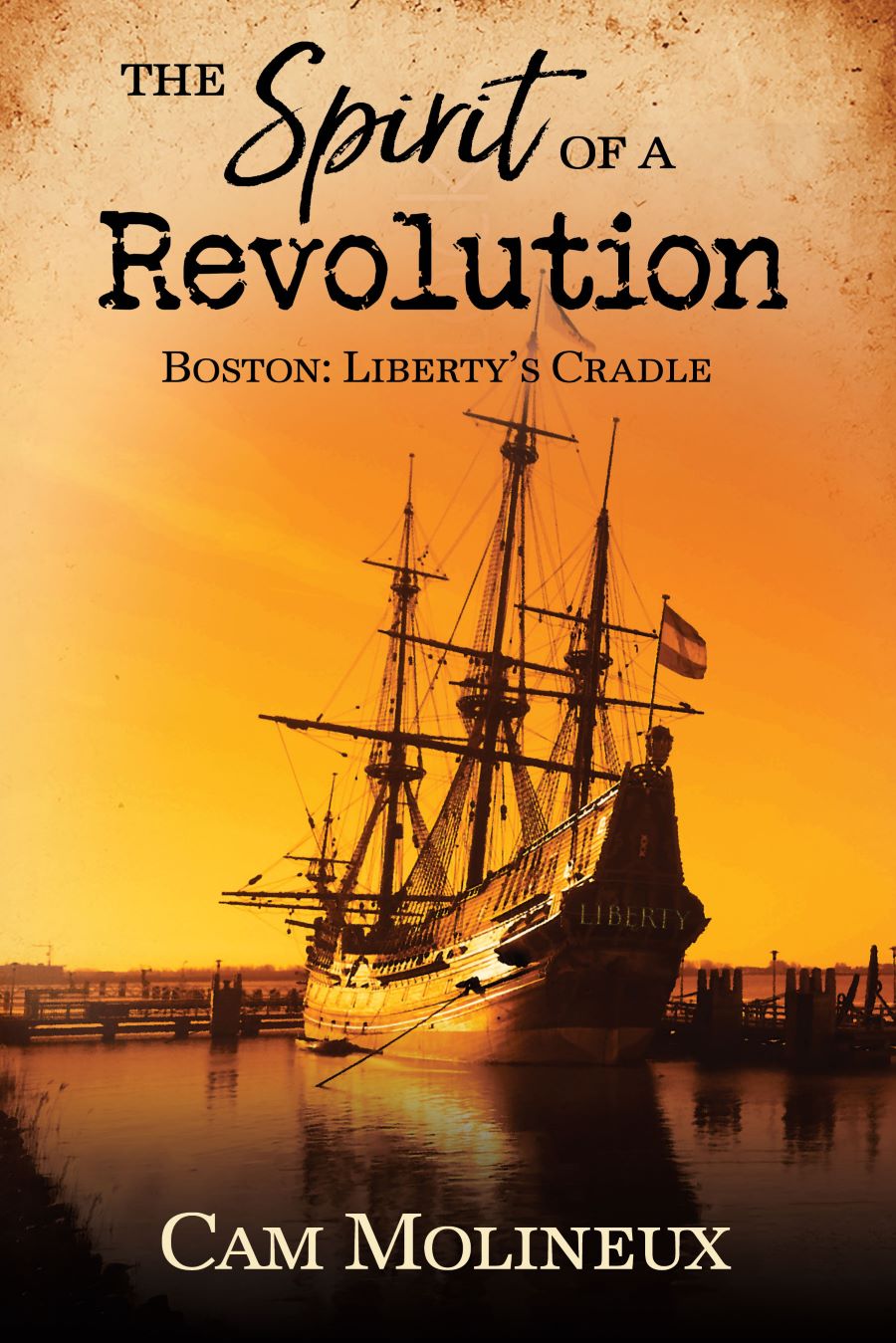Q&A with Cam Molineux, author of The Spirit of a Revolution

Hi friends! I first heard about today’s guest, Cam Molineux, when I listened to her interview on the All Things podcast with Athena Dean Holtz. My interest in her story was captured when I recognized her as a fellow family-tree researcher — even more so as her discoveries led her to write a book about one of her ancestors. Cam’s new book, The Spirit of a Revolution, seeks to remind fellow Americans what our founding fathers believed in and what was worthy of a fight.
Cam, welcome! Your book, The Spirit of a Revolution features a man named William Molineux. Fill us in on his backstory, please, and tell us too: is it just a coincidence that you share a last name?
William Molineux first appears in 1742 in Boston when chosen as a constable—think policeman or deputy. By then he was twenty-five years old. He married in 1747. As hard as my Mx cousins and I have tried to figure out where he was prior, at the moment, we can only speculate. (“Mx” is shorthand for the more than two hundred ways to spell the surname.)
One of his contemporaries, a judge who didn’t think very highly of Molineux, claimed he was from Wolverhampton, England. DNA points to Wolverhampton’s shire for my Mx roots, so I’m hopeful there’s a connection. It’s not unusual for folks to graft notable people into their tree without documentation to back it up. Since William Molineux was well-known in his day, I tried to prove he was NOT in my tree—contrary to a family tradition—but evidence indicates he IS in my family tree.
Molineux may have passed through Ireland before heading to the colonies, and his ancestors likely descended from Mxes in Liverpool, England (via Normandy with William the Conqueror in 1066 A.D.), or the non-Viking portion of France with the Huguenots.
The key element to understand about Molineux is that he was a merchant. Technically, a smuggler. This gave me pause until I realized his next-door neighbor, John Hancock, was right in there with him—along with a ton of other respectable tradesmen of their day.
The Spirit of a Revolution captures events in colonial America leading up to the infamous Boston Tea Party. Why do you see this story as particularly relevant today?
Excellent question. In colonial times, the clothes and food were different, but the struggles are eerily familiar. One of my readers claimed that at the end of each chapter she had to ask herself if what she was reading referred to THEN or to TODAY. Among other things, my novel fleshes out prerevolutionary Boston as it pushed back against Britain’s attempts to constrain free speech, the right to bear arms, and even the right to assemble. Sound familiar?
You’ve got a couple more books planned. Who is your target audience for this series, and why?
I chuckle when I think about the answer to this question. One of the first things I learned when I started working on my book was the importance of figuring out your target market. I worked hard to do so, and finally decided on “politically conservative, middle-aged men.” When I pitched to that demographic, the wife would jump in and say, “Yeah, that sounds like something he’d like to read, but I want to read it, too, and want our kids to read it!” Sigh. So much for narrowing my target market.
I eventually realized it wasn’t so much about age or gender, as much as it was about love of country or about helping others understand the history of the land of the free. I wrote on an adult level but have had tons of positive feedback from the homeschool market—middle and high school. They love books that make history come alive, which is exactly what I’ve attempted to do in my novel.
It’s not a romance, but I added dashes of Molineux’s wife and kids in order to make it appealing to the entire family but not so much it would push away my original target market.
Looking back at America’s history means enough to you that you devoted years of your life to researching and writing a book about a piece of it. Why?
For years—or decades—many have sought to rewrite history to suit their own ideologies or political agendas. Stripping away truth from our history books is similar to building on a faulty foundation. (Little-known fact: I was a licensed residential builder until the collapse of the housing industry in 2008, so I know something about construction.)
A weak foundation might seem insignificant in a new home, but eventually telltale signs begin to emerge. A sagging floor or crack in the wall can indicate a more serious problem which might lead to significant issues for the entire structure.
In America, we’ve let others propagate a false narrative, and cracks in our walls have finally become evident. Is it too late to change our course? I’m not sure, but I refuse to sit on the sidelines and simply watch the country I love crumble.
The familiar bumper sticker “Freedom Isn’t Free” is so true. Although not all of us are able to put on a uniform and physically fight for the liberties we hold dear, we each have something to contribute. For me, it was—and is—writing. Through storytelling, I can remind fellow Americans what our founding fathers believed was worthy of a fight and hopefully inspire them to protect the liberties we often take for granted.
Cam, part of the reason I was drawn to your personal story was that we both innocently began researching our family trees, hoping to collect a few interesting tidbits, only to be stunned by some of the discoveries therein. I discovered that I’m a descendent of not only at least twelve Mayflower passengers but also Philip Delano, as well as Jacob Towne, father of three daughters who were accused during the Salem Witch Trials. What were some of your surprising discoveries?
First, I discovered history is about REAL people. Who knew? Once we get past the names and dates, we discover they often had hopes, dreams, and convoluted lives like us.
Next, I found people in my tree I couldn’t believe were there. There were circuit-riding preachers. A close friend and colleague of George Washington (Edmund Pendleton), the Father of the Constitution (James Madison), and a signer of the Declaration of Independence (John Penn). And of course, William Molineux who historians say was second only to Samuel Adams in his influence on the streets of Boston in the years leading up to the Revolutionary War. Molineux was accused of being the author of the Boston Massacre—through his rabble-rousing—and was the oldest participant in the Boston Tea Party. Don’t tell him that. He thought he was, and indeed acted like, a youngster.
What three pieces of advice and encouragement would you give others who have a curiosity about their family trees?
- If at all possible, get started while the previous generation or two is still available to tell you what they know. There’s a reason many wait until retirement to dig into their family trees. It takes time. With kids, jobs, and other responsibilities, it can be tough to find room in your busy schedule. Get creative—involve the kids in interviewing older relatives and take day trips or vacations to long-ago places, even to cemeteries. One of my favorite grave markers indicated a relative saw Cornwallis surrender to George Washington. You never know what you might find, and that’s half the fun!
- Don’t believe everything you hear—or even read. Grandma might remember something one way, but documents (or DNA) might tell a different story. Be respectful, but be diligent to uncover tidbits that will hold up under scrutiny.
- Look for God’s faithfulness and grace—to you and/or your ancestors—in both the good, the bad, and the ugly. He has woven together a story, not only in American history, but in your situation as well. Rejoice in it, and as they would say in colonial Boston, “Huzzah!”
Thank you, Cam! It’s been a delight having you here today.
More about the author:
Award-winning author and speaker Cam Molineux wants to help Americans understand and fall in love with their history. With genealogical ties to and a shared patriotic spirit with The Spirit of a Revolution’s protagonist, she is uniquely qualified to tell his story. Her articles have appeared in an international publication for those with ties to the Molineux family tree.
More about the book:
In the years leading up to the Revolutionary War, the American colonies are teetering on the brink of disaster. With the threat of unbridled control by the British Parliament, Boston patriots seek to overturn their Motherland’s tyrannical practices.
William Molineux, a rabble-rouser and little-known figure in American history, resists Britain’s oppressive ways so colonists can live in the land of the free and be masters of their own destiny. The struggle for freedom in prerevolutionary Boston-by real people with hopes, dreams, and families-is eerily similar to what Americans face in the opening decades of the twenty-first century.
Buy the book here.

